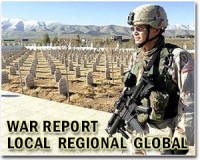| . |  |
. |
Jerusalem (AFP) Jan 14, 2011 The Israeli army is to begin collecting weapons from Jewish settlers as a result of the calm in the West Bank and over fears they may be used against Palestinians, a newspaper reported on Friday. The move would affect hundreds of weapons handed out to settlers by the army at the start of the second intifada, or Palestinian uprising, which erupted in September 2000, the top-selling Yediot Aharonot daily reported. The Israeli army could not immediately confirm the report, which said the military directive had already been passed on to security officers in settlements in and around the southern city of Hebron. According to the paper, the decision was taken in light of the improved security situation in the past two years, and also due to the growing number of weapons being stolen from settlements. But it was also taken over concerns about settlers taking the law into their own hands and shooting any Palestinians they perceive as a threat, the paper said, without citing a source. When the weapons were first handed out, it was one gun for every 10 settlers, but in practice, many more were handed out, it said. A military source told the paper the Hebron operation would be repeated across the entire West Bank. "You have to remember that in the last two years it has become significantly quieter. Of course, if a need arises, we will return the weapons to the residents, but with supervision," the source was quoted as saying.
earlier related report The initiative, spearheaded by the ultra-nationalist Yisrael Beitenu party of Foreign Minister Avigdor Lieberman, seeks to expose alleged foreign funding of groups accused of helping build war-crimes cases abroad against Israeli military personnel. "We want to fight against Israeli organisations which are working for the worldwide delegitimisation of Israel thanks to funds provided by foreign governments, said MP Danny Danon, of Prime Minister Benjamin Netanyahu's Likud party. But fellow Likud colleague Benny Begin, a minister without portfolio, argued that the initiative is a step too far. "One needs to distinguish between majority rule and the dictatorship of the majority," he responded. "MPs cannot at the same time be investigators, attorneys and judges." Dan Meridor, Israel's intelligence minister, is another senior Likud member opposed to Lieberman's plan. "It is very dangerous for parliamentarians to investigate groups with whose ideals they disagree," he said in an interview in the left-leaning Haaretz daily. "When freedom of expression is threatened, Israeli democracy is in danger." Lieberman was quick to respond, denouncing them at a party meeting as "feinschmeckers" -- a Yiddish term for someone of overly delicate sensibilities. And he heaped further criticism on the NGOs and rights groups, calling them "pure accomplices to terror" whose aim was "to weaken (the Israeli military) and to weaken its resolve to defend citizens of the state of Israel." Lieberman singled out Breaking the Silence, a group of army veterans who bear witness to abuses they have seen or taken part in during their military service in the occupied Palestinian territories. He also mentioned Machsom Watch, whose volunteers monitor soldiers' behaviour at military checkpoints, and medical watchdog Physicians for Human Rights. Lieberman's blunt attack provoked a sharp response from visiting Norwegian Foreign Minister Jonas Gahr Stoere, who told the English-language Jerusalem Post that such comments were "dangerous." "When leading politicians go out and compare and link NGOs to terror, I think it is very dangerous," he said. "These messages have enormous impact and create suspicion, mutual suspicion and a climate that democracy should not have. I think it is a worrying sign." But it was Lieberman's attack on the Likud ministers that drew a bristling response from Netanyahu. He described his party as "democratic and pluralistic, not bossed around by the dictatorship of a single opinion" in reference to the minister's authoritarian leadership style in his own party. Meanwhile, six left-wing organisations calling themselves "The Democratic Camp" are planning a weekend rally in Tel Aviv against "the witch-hunt," which they say is damaging Israel's democracy. The move was also condemned by group of leading intellectuals who wrote to MPs warning that the Knesset, or parliament, had "raised its hand against democracy in Israel." Political scientist Gerald Steinberg, of Bar-Ilan University, near Tel Aviv, estimates that about 100 NGOs in Israel and the Palestinian Territories receive annual covert payments of 100 million euros ($131.5 mn), mostly from European countries. "Under cover of defending human rights, many are waging a political fight to delegitimise Israel on the international stage," said Steinberg, who heads the rightwing watchdog, NGO Monitor.
Share This Article With Planet Earth
Related Links
 Palestinians blame Netanyahu for talks deadlock
Palestinians blame Netanyahu for talks deadlockRamallah, Palestinian Territories (AFP) Jan 12, 2011 The Palestinians blamed Israel's Prime Minister Benjamin Netanyahu on Wednesday for the deadlock in the peace process because of Jewish settlement in the occupied territories. "The Israeli government and its chief Benjamin Netanyahu are responsible for the current crisis in the peace process and the deadlock provoked by their obstinacy in continuing settlement activity," president Mahmud Abb ... read more |
|
| The content herein, unless otherwise known to be public domain, are Copyright 1995-2010 - SpaceDaily. AFP and UPI Wire Stories are copyright Agence France-Presse and United Press International. ESA Portal Reports are copyright European Space Agency. All NASA sourced material is public domain. Additional copyrights may apply in whole or part to other bona fide parties. Advertising does not imply endorsement,agreement or approval of any opinions, statements or information provided by SpaceDaily on any Web page published or hosted by SpaceDaily. Privacy Statement |